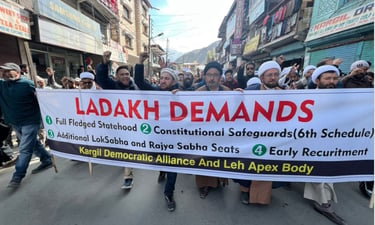Massive Protests Erupt at BJP Office in Leh as Ladakh Shuts Down Over Statehood Demand
Leh, Ladakh – A wave of anger swept through Ladakh’s Leh town as massive protests broke out at the Bharatiya Janata Party (BJP) office on Wednesday. The demonstrations, fueled by the long-standing demand for full statehood and constitutional safeguards under the Sixth Schedule, turned tense as locals staged a complete shutdown across the region.


By: Bharat Daily Samachar Date: 24 Sep,2025
Leh, Ladakh – A wave of anger swept through Ladakh’s Leh town as massive protests broke out at the Bharatiya Janata Party (BJP) office on Wednesday. The demonstrations, fueled by the long-standing demand for full statehood and constitutional safeguards under the Sixth Schedule, turned tense as locals staged a complete shutdown across the region. What began as a peaceful call for attention soon escalated into heated confrontations, marking one of the biggest political flashpoints since Ladakh was carved out of Jammu and Kashmir in 2019.
The Background: Ladakh’s Identity at Crossroads
Ladakh was granted Union Territory status after the abrogation of Article 370 in August 2019, a move that initially brought celebrations among many residents. People hoped for greater autonomy, more funds, and faster development. However, with time, frustrations grew as promises of land protection, cultural preservation, and job opportunities remained unfulfilled.
Unlike states, Union Territories are directly governed by the Centre, leaving local leaders with limited powers. For Ladakhis, especially those dependent on traditional livelihoods like farming, tourism, and pastoralism, this shift has raised fears of losing land rights and cultural identity to external forces.
Now, the demand for full-fledged statehood and inclusion in the Sixth Schedule of the Constitution—which protects tribal land and resources—has become the focal point of public unrest.
The Shutdown and Escalation
On Wednesday morning, Leh resembled a ghost town. Shops were shuttered, roads were deserted, and public transport came to a halt as people joined the strike called by civil society groups and political leaders.
The protesters then marched towards the BJP office in Leh, chanting slogans like “Statehood for Ladakh, now or never!” and “Protect our land, protect our identity!”.
What followed was chaos—demonstrators attempted to storm the BJP office, leading to scuffles with security personnel deployed to maintain order. Although no major violence was reported, the intensity of the protests highlighted the depth of frustration brewing among Ladakhis.
Why the Anger Against BJP?
The BJP had played a key role in the political restructuring of Jammu and Kashmir, including Ladakh’s separation. In 2019, the party had assured Ladakhis that Union Territory status would pave the way for development, autonomy, and recognition of Ladakh’s unique identity.
But locals now accuse the BJP of ignoring their voices. Instead of empowerment, many feel sidelined, with decision-making concentrated in New Delhi rather than Leh or Kargil.
Leaders of the protest said, “We were promised protection of land, culture, and jobs. Instead, we are being pushed into a situation where outsiders will take over our resources, and Ladakhis will become strangers in their own homeland.”
The Larger Demands
The agitation isn’t just about statehood. Protesters are also demanding:
Inclusion under the Sixth Schedule to safeguard tribal land, culture, and resources.
A separate Public Service Commission to ensure local youth get fair opportunities in jobs.
Protection of environment and fragile ecosystem amid increasing mining and development projects.
A stronger voice in governance, with powers vested in locally elected representatives rather than bureaucrats from outside the region.
Political Reactions
Opposition parties and local organizations have supported the shutdown, calling it a “wake-up call” for the central government. Meanwhile, BJP leaders tried to downplay the incident, urging dialogue instead of confrontation.
A senior BJP leader in Leh said, “We understand the concerns of the people, but solutions cannot come through violence. The Centre is already working on plans to address Ladakh’s aspirations.”
However, protesters remain unconvinced, pointing out that repeated assurances in the past have not translated into action.
The Way Forward
The unrest in Ladakh is a reminder that political restructuring is not just about maps and administrative labels—it is about people, culture, and their sense of belonging. While the Centre views Union Territory status as an administrative upgrade, locals perceive it as a dilution of their voice in governance.
If the government fails to engage meaningfully with Ladakhi leaders, the protests may intensify further. Experts warn that alienation in such a sensitive border region—strategically located near China and Pakistan—can have larger national security implications.
Voices From the Ground
Tsering Dorje, a local shopkeeper in Leh, said: “For the last five years, we have waited patiently. Nothing has changed for us. If we don’t stand up now, our future generations will suffer.”
Similarly, student leader Padma Angmo added: “We don’t want just promises, we want constitutional safeguards. Otherwise, our culture and our mountains will be lost.”
Conclusion
The protests at the BJP office in Leh are not just about a political demand—they represent the struggle of Ladakh’s people to preserve their identity, environment, and future. The Centre now faces a critical test: Will it address Ladakh’s concerns with urgency, or allow discontent to deepen?
For now, Leh remains tense, and the voices on the streets are loud and clear: “Statehood and safeguards are not a privilege—they are our right.”
